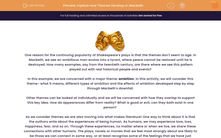
One reason for the continuing popularity of Shakespeare's plays is that the themes don't seem to age. In Macbeth, we see an ambitious man evolve into a tyrant, where peace cannot be restored until he is destroyed. How many examples, say from the twentieth century, are there where we see this pattern played out with real historical people and events?
In this example, we are concerned with a major theme: ambition. In this activity, we will consider this theme- what it means, different types of ambition and the effects of ambition developed step by step through Macbeth's downfall.
Other themes can be looked at individually and we will be concerned with how they overlap to support this key idea. How do appearances differ from reality? What is good or evil, can they both exist in one person?
As we consider themes we are also moving into what makes literature! One way to think about it is that the authors write about the experiences of being human. As humans, we may experience love, loss, happiness, fear, and so on. Through these experiences, no matter where or when we live, we share these connections with other humans. The plays, novels or movies that we feel most strongly about are likely to be those we can connect in some way, or at least recognise some of the feelings that we have just named, as being parts of the human condition.
You should always refer to your own text when working through these examples. These quotations are for reference only.








